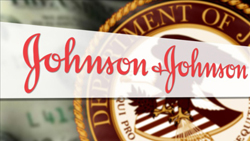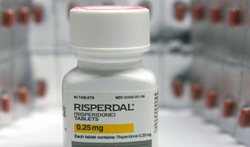Reporting on Health –
November 7, 2013
By Martha Rosenberg
On the surface, Johnson & Johnson’s $2.2 billion settlement this week for illegally marketing drugs to the elderly, children and the mentally disabled looks like a victory. J&J’s subsidiary, Janssen Pharmaceuticals, will plead guilty to illegally promoting the antipsychotic Risperdal for “controlling aggression and anxiety in elderly dementia patients and treating behavioral disturbances in children and in individuals with disabilities,” reports Reuters. The promotions included a brazen kickback scheme to Omnicare Inc, a pharmacy supplying nursing homes, exposed by a whistleblower.
At least 15,000 elderly people in nursing homes die a year from drugs like Risperdal said FDA drug reviewer David Graham in Congressional testimony a few years ago. Eli Lilly, who makes the similar drug Zyprexa, and AstraZeneca, who makes Seroquel, have also settled charges that they churned the elderly drug market at the price of Grandma and Grandpa’s lives.
But it is not a victory. J&J made $24.2 billion off Risperdal from 2003 to 2010 and shareholders won’t even notice this week’s nano loss. J&J milked Risperdal for all it was worth and the patent had already run out by the time it was charged with illegal schemes. Other drug giants charged with illegal marketing schemes–Abbott for Depakote, Pfizer for Bextra, Eli Lilly for Zyprexa, AstraZeneca for Seroquel, GlaxoSmithKline for Paxil and Merck for Vioxx–also got their money’s worth before the trivial nuisance of suit. Many, like Pfizer, who illegally marketed its seizure drug Neurontin while under probation for illegal Lipitor activities, are brazen and shameless repeat offenders.
 Many say the only justice that will get Big Pharma’s attention is frog marching the CEOs off to prison and/or cutting them off from their lucrative public trough of Medicare, Medicaid and military health programs.
Many say the only justice that will get Big Pharma’s attention is frog marching the CEOs off to prison and/or cutting them off from their lucrative public trough of Medicare, Medicaid and military health programs.
Still, Big Pharma’s audacious business plan of asking forgiveness not permission is winding down. Not because Pharma, prescribers, consumers, regulators and health officials have seen the light, but because there are no more big drugs to pimp. An estimated 100,000 workers will be losing their jobs at Pfizer, Sanofi, Roche, GlaxoSmithKline, AstraZeneca and Merck reported Yahoo finance last month.
Only two new drug campaigns seem to be brewing and they require a major suspension of reality on the part of doctors and patients. One tries to convince people with low back pain they actually suffer from ankylosing spondylitis an arthritis-like condition that causes chronic inflammation of the spine. If your spine is stiff when you wake up in the morning you can take an immune suppressor like Humira which puts you at risk of tuberculosis and lethal viral, fungal and bacterial infections while costing you $12,000 to $17,000 a year. Line forms to the left.
The other, even more brazen campaign, tries to convince people with insomnia, tiredness during the day, moodiness and relationship problems that they actually suffer from Non-24-Hour Sleep–Wake Disorder, a disorder that affects mostly blind people. You don’t have to be blind to have the disorder, says the new Pharma message even though there have been fewer than 100 cases of sighted people with non-24 reported in the scientific literature. It sounds like a stretch but so did convincing people with job, money and marriage problems they really had depression or bipolar disorder.
Still it is obvious the bloom has fallen off the Big Pharma rose and it is now paying the piper for the high-flying party with drug settlements like Johnson & Johnson’s this week. But that doesn’t mean shady marketing, hidden risks, kickbacks and outrageous prices are gone from the medical field. They have just moved to the Medical Device industry.
http://www.reportingonhealth.org/2013/11/07/will-risperdal-settlement-change-anything


